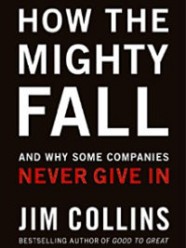Latest

A note on trader Sharpe ratios. (2009)
"Financial traders are assessed by how much money they make per unit of risk taken, known as the Sharpe Ratio.. a population of experienced traders attain Sharpe Ratios significantly higher than the...
How the mighty fall: and why some companies never give in. (2009)
“Hubris born of success is the first of five stages of corporate decline.” Jim Collins, author, leadership & management practitioner, former Stanford University academic. Published by Collins Business Essentials. “If...

Hubris syndrome: an acquired personality disorder? A study of US Presidents and UK Prime Ministers over the last 100 years. (May 2009)
"Qualities often associated with successful leadership can also be marked by impetuosity, a refusal to listen to or take advice and a particular form of incompetence when impulsivity, recklessness and frequent...
Unsecured Ladders: meeting the challenge of the unexpected. (2009)
"We spend years climbing career ladders only to risk being brought down by unexpected events that were 'not in the plan'. Is this also inevitable? Graham Robinson, Visiting Research Fellow,...

Social hierarchy: the self-reinforcing nature of power and status. (2008)
"In this review, we revisit some basic psychological and sociological elements of hierarchy and argue that status and power are two important yet distinct bases of hierarchical differentiation. Magee,...

Power reduces the press of the situation: implications for creativity, conformity and dissonance. (2008)
"..explores whether power psychologically protects people from influence. ...experiments demonstrate that the powerful (a) generate creative ideas that are less influenced by salient examples, (b) express attitudes that conform less.... Galinsky, A.D.,...

The trouble with overconfidence. (2008)
"On difficult tasks, people overestimate their performance but also mistakenly believe that they are worse than others. On easy tasks, people underestimate their actual performances but mistakenly believe they are...

Who makes acquisitions? CEO overconfidence and the market’s reaction. (2008)
"Overconfident CEOs over-estimate their ability to generate returns. As a result, they overpay for target companies and undertake value-destroying mergers. The effects are strongest if they have access to internal...

Overconfidence, CEO selection, and corporate governance. (2008)
"...an overconfident manager, who sometimes makes value-destroying investments, has a higher likelihood than a rational manager of being deliberately promoted to CEO under value-maximizing corporate governance. Goel, A.M., DePaul University, Thakor, A.V.,...

Are overconfident CEOs born or made? Evidence of self-attribution bias from frequent acquirers. (2008)
"Many CEOs overestimate their own negotiating skills and overlook the element of luck in successful mergers, acquisitions, and other deals. CEOs appear to overly attribute their role in successful deals, leading...







